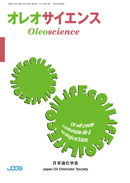All issues

Volume 8, Issue 3
Displaying 1-3 of 3 articles from this issue
- |<
- <
- 1
- >
- >|
-
Takenori MARUYAMA2008Volume 8Issue 3 Pages 107-114
Published: March 01, 2008
Released on J-STAGE: June 01, 2013
JOURNAL FREE ACCESSIn Japan, in recent years trans fatty acids (TFA) in food have received considerable attention among the food manufactures, retailers and consumers. In June 2007, Japan Food Safety Commission reported that the mean intake of TFA by the Japanese population was 0.7g/ person/ day (0.35 % of energy) based on household food consumption surveys or 1.3g/ person/ day (0.6% of energy) based on food production amounts. The latter estimate decreased from 1.56g (0.7% of total energy) in 1998 and was considerably lower than in western countries and recommendations by WHO & FDA (<1% energy). It is noteworthy that Japanese traditional diets has relative low amount of fats. Although the low TFA intake in Japan is not thought to be an important problem at present, we should pay attention to an excessive consumption of TFA by the young population as they prefer western foods.View full abstractDownload PDF (1241K) -
Shigeru TOKAIRIN2008Volume 8Issue 3 Pages 115-119
Published: March 01, 2008
Released on J-STAGE: June 01, 2013
JOURNAL FREE ACCESSAt the present condition, the negative aspects trans fatty acids (TFAs) contained in hydrogenated vegetable oils have been strongly pointed out while the positive ones have been forgotten. In this thesis we express the producers' viewpoint about the usefulness of edible processed fats and oils in the aspect of their physical and functional characteristics as material. When discussing the problems related to TFAs it is difficult to reach the right recognition without well understanding the above mentioned both aspects of TFAs and we are afraid that the discussion may go the wrong way if based on the knowledge of the negative aspects only. This thesis also includes the Japan Margarine Shortening & Lard Industries Association opinion.View full abstractDownload PDF (903K) -
Michihiro SUGANO2008Volume 8Issue 3 Pages 121-126
Published: March 01, 2008
Released on J-STAGE: June 01, 2013
JOURNAL FREE ACCESSAs trans fatty acid (TFA) worsens serum cholesterol profiles and enhances the risk of cardiovascular disease, more attention should be paid than saturated fatty acid. In Japanese, it may safely be said that the adverse effect can be disregarded because of an average dietary intake low in TFA and relatively high in polyunsaturated fatty acids. However, in people whose fat intake is undoubtedly higher than that recommended by dietary guidelines, TFA will be a risky fatty acid as in Europeans and Americans. Several countermeasures are engaged to produce fats with no or less TFA, and hence, it is possible to reduce the intake through a piece of attention.View full abstractDownload PDF (2065K)
- |<
- <
- 1
- >
- >|